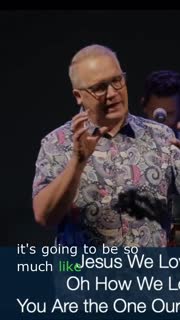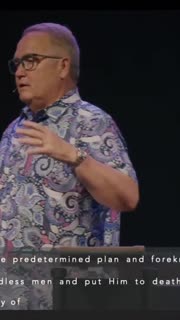The Power of the Sacrificial Lamb and Our Words
Devotional
Sermon Summary
Bible Study Guide
Sermon Clips
### Quotes for Outreach
1. "Sometimes it's hard to wrap your mind around what Jesus did for us and what happened, what the value of it, the importance of it, that when he said, I want you to do this in remembrance of me. And they're like, yeah, Jesus, we're never going to forget you. I mean, this has been amazing. This is amazing. They don't see and they have. They don't see an end, right? So to think of the price that's paid, just to take these moments and to think about the price that was paid, what Jesus suffered, what he did, what he accomplished on our behalf, to remember that, to remember that it required the death of the lamb. Jesus had to die so that we could celebrate this. This has such value." [22:10]
2. "Paul said, it's going to be so much like that. He said, just try to get ahold of this, just get a glimpse of the height, the depth, the breadth, and the length of Christ, the love of Christ, just try to wrap your mind around just a little bit of the love of Christ. He says, which surpasses knowledge. He said, you're never going to get it. You're never going to get it. But you can always, when you think about how God loves you and how much Jesus loves you and what he did for you, you can always, for a moment, go, wow, and heaven is going to be endless wows of the glory in the presence of God." [39:22]
3. "So, James chapter 3. Let not many of you become teachers, my brethren, knowing that as such, we will incur a stricter judgment. So, the way he says this, he's talking to himself about himself too. For we all stumble in many ways. If anyone does not stumble in what he says, he's a perfect man, able to bridle the whole body as well. Now, we put bits into the horse's mouth so that they will obey us. And we direct the entire body as well. Look at the ships also. They are so great and are driven by strong winds. Are still directed by a very small rudder, wherever the inclination of the pilot desires. So, also the tongue is a small part of the body. And yet, it boasts of great things. See how great a forest is set aflame by such a small fire." [45:51]
4. "So, the words of God created reality. God spoke the worlds into existence. Now, we're not God. And we cannot speak light into existence. But we still create a level of reality with our words. You think about it. Where does your self-image come from? Your self-image comes from a culmination of all the words that have been said to you by parents and friends and teachers and enemies over the years. You kind of have built out of what people have said and what you believe about yourself. You have built a self-image." [49:49]
5. "So, we need to be people of grace and truth. And how do we heal with words? And so I've got just a limited time here. But the wisdom from above is pure, peaceable, gentle, reasonable, full of mercy and good fruits, unwavering, without hypocrisy. And the seed of whose fruit is righteousness, is sown in peace by those who make peace. So how do we make peace when verse 8 tells us that no one can tame the tongue? It is a restless evil and full of deadly poison. I believe it is beyond man's natural ability to control the tongue. We need some kind of God-inspired, God-empowered change. We need something to happen. We need the empowering of the Spirit of God so that we can change." [01:04:39]
### Quotes for Members
1. "So, you know, he would say things without thinking, or even when he thought, it didn't make any difference. He's a lot like us. He's a lot like us, right? Then six days later, so six days later, Jesus took him with Peter and James and John, his brother, and led them up on the high mountain by themselves. And he was transfigured before them, and his face shone like the sun, and his garments became as white as light. And behold, Moses and Elijah appeared to them, talking to them. And Peter said to Jesus, Lord, it's good for us to be here. If you wish, I will make three tabernacles here, one for you, one for Moses, and one for Elijah. I like this. And while he was still speaking, in other words, he didn't stop talking at that. He's still speaking. He's there in the presence of Jesus, Moses, and Elijah, and Peter is the one that's talking. Think about that. He's with Jesus, Moses, and Elijah, and Peter is talking." [01:07:07]
2. "So what does this say? To us, we need a Pentecost. We need an empowerment. Every believer needs an empowerment by the Holy Spirit to help us because we struggle in this area. We struggle with our mouths. We struggle with sin. So Paul says to the Ephesians, don't get drunk with wine, for that is dissipation. It's a waste. But be filled with the Spirit, speaking to one another in psalms and hymns and spiritual songs, singing and making melody in your heart to the Lord, always giving thanks for all things in the name of our Lord Jesus Christ to God, even the Father. And what's interesting, he says don't be drunk with wine. So how do you get drunk with wine? You keep drinking. Right? How do you get drunk? You keep drinking. How are you filled with the Spirit? You have to keep getting filled. You know why? Because you leak. You're leaky." [01:11:15]
3. "So here's what James says. James says, every one of you are guilty. Doesn't he say that? I'm guilty. James says, we, James is writing this. He says, we all stumble. He even includes himself, the brother of Jesus. He says, hey, I don't have this. I've got to have the work of the Spirit in my life. I need help. We need help. And so the Lord wants to help you with your mouth. The Lord wants to help you with your mouth. Where your mouth is not a cursing, but a blessing. Where your mouth is leading people to God, not from God. Where your mouth is helping, it's healing. The Lord wants your tongue to be healing, to bring healing. You know, we're in a sick, hurting, desperate, dark world that needs the hope of Jesus. And you got it. And you spread it through words." [01:15:11]
4. "So I talked last week about salvation, how does salvation work? We're not ever saved by, but we're saved to works. And the evidence of our salvation is that we're going to do works. But we're not saved by those works. You've got to make sure you get that. But our relationship with Christ begins with us saying yes to God. But it's not the last yes we say. Walking with Jesus is just saying yes all the time. He's going to always, you're always saying yes. Yes, I've received Jesus as my Savior and Lord. Today, hey, you're going to forgive that person. Yes. Are you going to stop doing that? Yes. Are you going to love this person over here? Yes. It's a daily yes. And being filled with the Spirit is an ongoing invitation of recognizing that you need the Spirit of God in your life and surrendering and yielding and even asking." [01:12:23]
5. "So Jesus is moving towards the cross, and Jesus says at the Last Supper, all of you are going to betray me. And Peter says, not me. Not me. All these guys are losers, but not me. I'm not going to betray you. Even though all, everyone, everyone may fall away. I will never fall away. I will never fall away. And Jesus said, yeah, you will. And then in just about 30 verses later, while, after a little while, the bystanders came up and said to Peter, you certainly are one of them, for even your accent betrays you. Then Peter began to invoke a curse on himself and to swear. And, you know, the old fisherman came out in him. He said, I don't know. I do not even know the man. And at that moment, a rooster crowed. But then something happened. Day of Pentecost. So the Day of Pentecost comes, and something happens to the disciples." [01:08:20]
Ask a question about this sermon
1. "Sometimes it's hard to wrap your mind around what Jesus did for us and what happened, what the value of it, the importance of it, that when he said, I want you to do this in remembrance of me. And they're like, yeah, Jesus, we're never going to forget you. I mean, this has been amazing. This is amazing. They don't see and they have. They don't see an end, right? So to think of the price that's paid, just to take these moments and to think about the price that was paid, what Jesus suffered, what he did, what he accomplished on our behalf, to remember that, to remember that it required the death of the lamb. Jesus had to die so that we could celebrate this. This has such value." [22:10]
2. "Paul said, it's going to be so much like that. He said, just try to get ahold of this, just get a glimpse of the height, the depth, the breadth, and the length of Christ, the love of Christ, just try to wrap your mind around just a little bit of the love of Christ. He says, which surpasses knowledge. He said, you're never going to get it. You're never going to get it. But you can always, when you think about how God loves you and how much Jesus loves you and what he did for you, you can always, for a moment, go, wow, and heaven is going to be endless wows of the glory in the presence of God." [39:22]
3. "So, James chapter 3. Let not many of you become teachers, my brethren, knowing that as such, we will incur a stricter judgment. So, the way he says this, he's talking to himself about himself too. For we all stumble in many ways. If anyone does not stumble in what he says, he's a perfect man, able to bridle the whole body as well. Now, we put bits into the horse's mouth so that they will obey us. And we direct the entire body as well. Look at the ships also. They are so great and are driven by strong winds. Are still directed by a very small rudder, wherever the inclination of the pilot desires. So, also the tongue is a small part of the body. And yet, it boasts of great things. See how great a forest is set aflame by such a small fire." [45:51]
4. "So, the words of God created reality. God spoke the worlds into existence. Now, we're not God. And we cannot speak light into existence. But we still create a level of reality with our words. You think about it. Where does your self-image come from? Your self-image comes from a culmination of all the words that have been said to you by parents and friends and teachers and enemies over the years. You kind of have built out of what people have said and what you believe about yourself. You have built a self-image." [49:49]
5. "So, we need to be people of grace and truth. And how do we heal with words? And so I've got just a limited time here. But the wisdom from above is pure, peaceable, gentle, reasonable, full of mercy and good fruits, unwavering, without hypocrisy. And the seed of whose fruit is righteousness, is sown in peace by those who make peace. So how do we make peace when verse 8 tells us that no one can tame the tongue? It is a restless evil and full of deadly poison. I believe it is beyond man's natural ability to control the tongue. We need some kind of God-inspired, God-empowered change. We need something to happen. We need the empowering of the Spirit of God so that we can change." [01:04:39]
### Quotes for Members
1. "So, you know, he would say things without thinking, or even when he thought, it didn't make any difference. He's a lot like us. He's a lot like us, right? Then six days later, so six days later, Jesus took him with Peter and James and John, his brother, and led them up on the high mountain by themselves. And he was transfigured before them, and his face shone like the sun, and his garments became as white as light. And behold, Moses and Elijah appeared to them, talking to them. And Peter said to Jesus, Lord, it's good for us to be here. If you wish, I will make three tabernacles here, one for you, one for Moses, and one for Elijah. I like this. And while he was still speaking, in other words, he didn't stop talking at that. He's still speaking. He's there in the presence of Jesus, Moses, and Elijah, and Peter is the one that's talking. Think about that. He's with Jesus, Moses, and Elijah, and Peter is talking." [01:07:07]
2. "So what does this say? To us, we need a Pentecost. We need an empowerment. Every believer needs an empowerment by the Holy Spirit to help us because we struggle in this area. We struggle with our mouths. We struggle with sin. So Paul says to the Ephesians, don't get drunk with wine, for that is dissipation. It's a waste. But be filled with the Spirit, speaking to one another in psalms and hymns and spiritual songs, singing and making melody in your heart to the Lord, always giving thanks for all things in the name of our Lord Jesus Christ to God, even the Father. And what's interesting, he says don't be drunk with wine. So how do you get drunk with wine? You keep drinking. Right? How do you get drunk? You keep drinking. How are you filled with the Spirit? You have to keep getting filled. You know why? Because you leak. You're leaky." [01:11:15]
3. "So here's what James says. James says, every one of you are guilty. Doesn't he say that? I'm guilty. James says, we, James is writing this. He says, we all stumble. He even includes himself, the brother of Jesus. He says, hey, I don't have this. I've got to have the work of the Spirit in my life. I need help. We need help. And so the Lord wants to help you with your mouth. The Lord wants to help you with your mouth. Where your mouth is not a cursing, but a blessing. Where your mouth is leading people to God, not from God. Where your mouth is helping, it's healing. The Lord wants your tongue to be healing, to bring healing. You know, we're in a sick, hurting, desperate, dark world that needs the hope of Jesus. And you got it. And you spread it through words." [01:15:11]
4. "So I talked last week about salvation, how does salvation work? We're not ever saved by, but we're saved to works. And the evidence of our salvation is that we're going to do works. But we're not saved by those works. You've got to make sure you get that. But our relationship with Christ begins with us saying yes to God. But it's not the last yes we say. Walking with Jesus is just saying yes all the time. He's going to always, you're always saying yes. Yes, I've received Jesus as my Savior and Lord. Today, hey, you're going to forgive that person. Yes. Are you going to stop doing that? Yes. Are you going to love this person over here? Yes. It's a daily yes. And being filled with the Spirit is an ongoing invitation of recognizing that you need the Spirit of God in your life and surrendering and yielding and even asking." [01:12:23]
5. "So Jesus is moving towards the cross, and Jesus says at the Last Supper, all of you are going to betray me. And Peter says, not me. Not me. All these guys are losers, but not me. I'm not going to betray you. Even though all, everyone, everyone may fall away. I will never fall away. I will never fall away. And Jesus said, yeah, you will. And then in just about 30 verses later, while, after a little while, the bystanders came up and said to Peter, you certainly are one of them, for even your accent betrays you. Then Peter began to invoke a curse on himself and to swear. And, you know, the old fisherman came out in him. He said, I don't know. I do not even know the man. And at that moment, a rooster crowed. But then something happened. Day of Pentecost. So the Day of Pentecost comes, and something happens to the disciples." [01:08:20]










